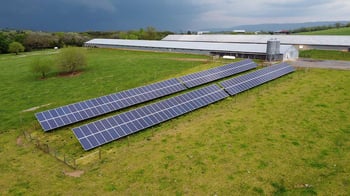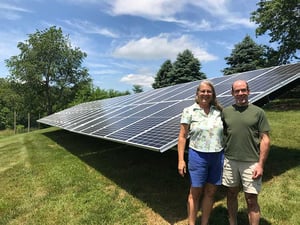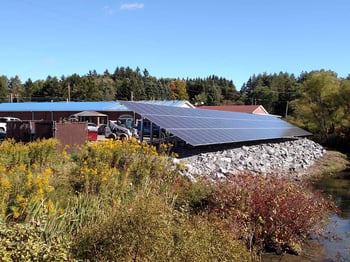Cost of Ground-Mount Solar Panels: What to Expect

Ground-mounted solar systems are free-standing structures that support solar panels. Because they can be installed wherever conditions are best for solar power production, they’re a great alternative to the traditional roof-mount solar system.
In this blog, we’ll talk about how much it costs to install a ground-mounted solar panel system, as well as how much money a ground-mounted system could save you.
The Factors That Impact Ground Mount Solar Costs
 There are a lot of factors that contribute to the cost of a ground-mounted solar system. Some of these factors are based on decisions you’ll make. Some are simply out of your hands, pre-determined by things like your location’s climate and the terrain of your property.
There are a lot of factors that contribute to the cost of a ground-mounted solar system. Some of these factors are based on decisions you’ll make. Some are simply out of your hands, pre-determined by things like your location’s climate and the terrain of your property.
Your solar system will be custom-designed to meet your unique energy needs and your financial goals. Here are the factors that will impact your solar energy system’s price.
- How Much Electricity You'd Like to Produce - The more free electricity you want your solar system to produce, the larger it’ll be. This means more equipment and labor, leading to higher costs (but it also means greater savings).
- Added Technology - Ground-mounted solar systems can be installed as a static structure or as a tracking system. Tracking systems, or pole-mounted systems, utilize added technology to orient the solar panel to face the sun. They’ll change their direction as the sun moves across the sky during the day. While this does improve production, it is an additional cost and may require additional maintenance.
- Brand of Solar Panels - Top-of-the-line solar panels offer industry-leading warranties and are often more efficient. Mid-tier brands can deliver great value but may not be as efficient.
- Types of Solar Panels - Solar panels come in two main types—monocrystalline and polycrystalline. They also come in a variety of sizes and models. These factors can all impact the cost of your system.
- Brand of Inverters - Inverters convert the DC power generated by your solar system to usable AC electricity. What brand inverter you select will also impact the cost of your system.
- Type of Inverter(s) - There are three main types of solar inverters that you’ll have to pick from. You’ll have a choice between string inverters, microinverters, and string inverters with power optimizers.
- Shading and Local Weather Patterns - The more sunlight your solar panels get, the more electricity they produce. If you’re located in a cloudy climate or your property is shady, you may need to increase the size of your system to compensate.
- Interconnection Costs - These are fees required to connect to your local electric grid. They vary from utility to utility. Additionally, the further your system is from the interconnection point, the longer your wire run will need to be. This will increase the installation cost.
- Available Incentives - While some cost-saving incentives are available on a federal level, others may be available to you depending on your state, local government, or utility. Here’s a look a the solar incentives in your state.
The Cost of Ground-Mounted Solar Systems by Size
 Now that we’ve discussed the various factors that can impact the cost of your ground-mounted PV solar system, we can give you a rough idea of what one would cost.
Now that we’ve discussed the various factors that can impact the cost of your ground-mounted PV solar system, we can give you a rough idea of what one would cost.
It’s worthwhile to note that these are broad estimates. The cost of your custom-designed solar system could be more or less, depending on your energy production goals, the equipment you choose, and the location and terrain of your property.
Cost of Installing Ground-Mounted Solar Systems for Homes
The average homeowner can expect to pay between $27,000 and $60,000+ for a ground-mounted solar system.
Cost of Installing Ground-Mounted Solar Systems for Businesses and Farms
Businesses can expect to pay $150,000 to $500,000+ for a ground-mounted solar system.
Note: Depreciation savings are based on a 24% federal tax rate and do not include any depreciation on state taxes.
The cost of ground-mounted solar panels before and after incentives is significantly different for both residential and commercial/agricultural systems.
The after-incentive prices on the above charts reflect the widely available solar investment tax credit and accelerated depreciation. The tax credit is available to any tax-paying homes, businesses, and farms that own a solar system, and accelerated depreciation is available to any business or farm that pays federal taxes and owns their system. The savings from both incentives can be recovered the year the solar system is energized.
These may not be the only incentives available to you. State and local governments and some utility companies may offer additional incentives that further reduce the cost of your solar installation. The incentives your system qualifies for will vary depending on your location, the type of property on which you’re installing solar, and the size of your system.
Do Ground Mounts Cost More Than Roof Mounts?
Generally, ground-mounted solar panels will cost more to install than an equally sized roof-mounted system. This is partly due to the structure on which the solar panels are installed.
 A rooftop system is supported by the roof, and the building’s structure, meaning erecting a supporting structure is unnecessary. Instead, the panels are attached to a racking system which is then secured to the roof.
A rooftop system is supported by the roof, and the building’s structure, meaning erecting a supporting structure is unnecessary. Instead, the panels are attached to a racking system which is then secured to the roof.
But with a ground-mounted system, an independent structure will need to be erected to support the panels. The structure will consist of posts pounded deep in the ground for stable support, and then cross-beams are added to the racking system and the solar panels themselves.
Is The Extra Cost of a Ground Mounted Solar Array Worth It?
In some situations, the additional installation cost is justified by the advantages ground-mounted systems offer.
 A ground-mounted solar panel installation gives more freedom in terms of where it’s located. With rooftop solar panels, you’re confined to your roof.
A ground-mounted solar panel installation gives more freedom in terms of where it’s located. With rooftop solar panels, you’re confined to your roof.
Sometimes, your roof may not be large enough to hold a system that fully meets your electricity production goals. Or, your roof may not get enough sunlight to be an ideal location for solar. In a few cases, your roof may not be able to support the additional weight of the equipment.
With a ground-mounted system, you have more control over its location. As long as you have the available land, you might be able to install a larger system. You can also pick a sunny spot and orient it to maximize energy production.
If your building’s curb appeal is important and you don’t love the look of solar panels on its roof, you can install a ground mount in a much less visible area.
Overall, installing a ground-mounted solar system can greatly reduce your monthly costs, save on taxes, and set your property up for long-term, sustainable savings. Many solar panels have 25- or 30-year warranties, guaranteeing they’ll produce a significant amount of free electricity for many years to come.
Get the exact cost for a solar panel system that fits your needs
The best way to determine the cost of your ground-mount solar system is to request a free custom quote. With a custom quote, you'll see the complete installation cost, all available incentives, and the payback and ROI.
Not ready for a quote? Check out the cost of a roof-mounted solar system, or use our Solar Savings Calculator for an instant price and savings estimate for a solar system sized for you.You can also view The Solar Energy Channel on YouTube for short, educational videos that cover all things solar. Don't forget to subscribe while you're there!





